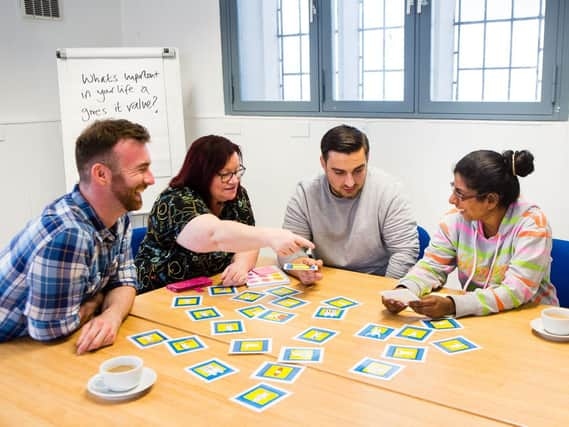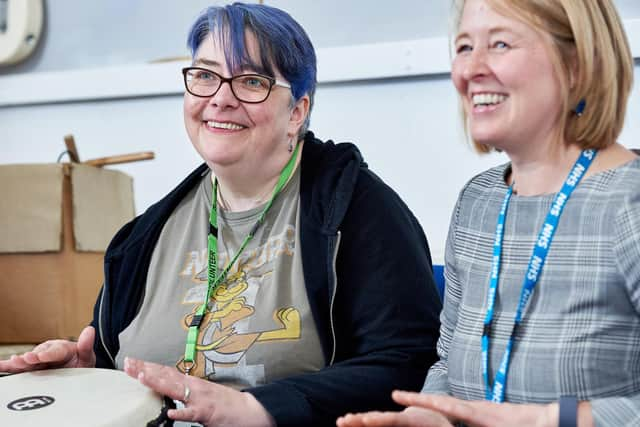How Yorkshire's mental health colleges are supporting people on a road to recovery


Ken Taylor speaks earnestly about how he “would have gone under” without the support of the mental health services in South and West Yorkshire. It is no understatement to say that his life has been transformed, and he is adamant that Kirklees Recovery College has played a vital role.
It is one of four community recovery colleges run by the South West Yorkshire Partnership NHS Foundation Trust, each one taking an educational, rather than clinical, approach to mental health and wellbeing.
Advertisement
Hide AdAdvertisement
Hide AdAcross the country, such colleges offer a range of courses from helping people to learn about and manage specific mental health issues to providing opportunities for them to build confidence, socialise and learn new skills for life and work.


And there is an emphasis on co-production; people with experience of mental health problems help to develop and deliver the programmes alongside healthcare professionals and partner organisations such as charities.
In 2014, Ken, who previously ran a charity, suffered a breakdown. “My life stopped completely. I had to give up work, I didn’t go out, I was self-harming, suicidal, the works.”
It was “a heck of a step” for him to walk through the doors of Kirklees Recovery College over 12 months later. He enrolled onto a photography course. “But it could have been anything,” he says. “It didn’t matter. It was about getting out of the house, through those doors and meeting people again.”
Advertisement
Hide AdAdvertisement
Hide AdKen enrolled onto several more courses and developed a plan for resilience and staying well. He began to volunteer, too, wanting to “give something back” and was later asked to do a full review of the trust’s recovery colleges.
“It was really developing my confidence in myself, using my skills so I felt worthwhile,” he says. “I was making connections with people again at all levels of the organisation as well as with people with similar problems to myself.”
Like Ken, many recovery college volunteers have undertaken courses themselves. Volunteer Jayne Robinson, who has helped to develop programmes around depression and anxiety at the Leeds Recovery College, first attended herself two years after experiencing a breakdown.
She enrolled on the Wellness Recovery Action Planning (WRAP) course, which helps people to identify “when things don’t seem quite right” and strategies that they can use to help them cope. “I really believe in the whole ethos of peer support – that really works for people,” she says.
Advertisement
Hide AdAdvertisement
Hide Ad“People who deliver the courses have lived experience and that’s what really talks to me about the recovery college. It’s bringing me back out,” she adds. “Those skills that I thought I had lost, they’re coming out slowly and the recovery college nurtures that.”
Fellow volunteer Ruth De Lissandri also attended a WRAP course at the college, run by Leeds and York Partnership NHS Foundation Trust, last year, after being in and out of mental health services for much of her life.
“It is about learning the skills to help keep yourself well so if you feel like you are heading towards a crisis, you can refer to those and look at what actually helps you. It’s really powerful,” she says.
Ruth says she feels she can cope better now and is volunteering to help run programmes. “It was something that I was passionate about, helping people with their mental health,” she says. “I have lived experience and empathy to support others.”
Advertisement
Hide AdAdvertisement
Hide Ad“I feel like I have got better coping mechanisms and that the recovery college has given me more hope as well,” she continues. “I think before I felt it was a case of just accepting that I would always have depression and I would always struggle with eating and my body image.
"This has given me focus that I can actually channel my energy elsewhere and help others. And I get something back from helping with the courses too because it’s reinforcing things - like practise what you preach.”
Jane Taylor, principal at The Exchange wellbeing and recovery college in Barnsley, explains the rationale behind recovery colleges. “The model is focused more on the person in recovery, it’s an educational model where people are empowered to make their own choices and decisions,” she says. “They can take charge of their life and aren’t wholly dependent on mental health services.”
“It’s a preventative measure as well,” adds Lindsey Taylor-Crossley, principal at the Wakefield recovery college. “Some people might not be in mental health services but they can still be poorly or need to understand a condition or want to manage their wellbeing.”
Advertisement
Hide AdAdvertisement
Hide AdThe key, they say, is to help people to fulfil their potential and live well in their community, with many of those who complete the courses feeling empowered to engage in employment, voluntary services, training courses or higher education.
“I think the really big thing we do is value people’s experiences,” says Simon Burton, development manager at Leeds Recovery College. “And we provide space for people to think about where they are at, what their stresses are and be in a space to reflect and learn.”
Recovery college courses are open to everyone, not just those with diagnosed mental illness. One woman, who has done several courses at The Exchange, says this is an important message for anyone thinking of accessing workshops and programmes.
“It is not just about recovering from mental health conditions,” she says. “When I signed up, I didn’t consider myself mentally unwell. It’s also about wellbeing. It’s good to get away from the view that you can only come here if you’re mentally unwell because that’s not the case...They’re preventing mental illness in many cases, helping people to become more resilient.”
Advertisement
Hide AdAdvertisement
Hide AdThe woman, who asked to be known only as Karen, signed up to a ‘Renew You’ course, exploring self image, in 2017 and started volunteering shortly afterwards. “It’s nice to be a living example of how a simple six week course can be life-changing,” she says. “It sounds a bit cheesy but it’s made a massive difference to my life.”
A fellow volunteer, named Diane, agrees. “Coming here has given me ways of helping myself without reaching that point of needing other intervention,” she says. “It’s helped my confidence, it’s helped my relationships with other people. I can honestly say it’s changed my life. I understand that I may get depressed again but I have ways of recognising it and perhaps averting the worst.”
For another volunteer, called Trev, who joined the college as a learner four years ago suffering depression and anxiety, the impact goes even further. “When you’re meeting people like you, it makes you feel better to know you’re not on your own,” he says. “I can honestly say that if it hadn’t been for this place, I don’t think I’d have been here today.”
